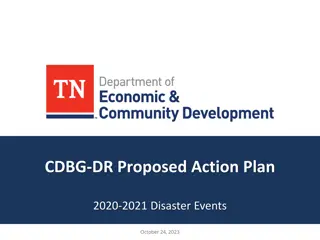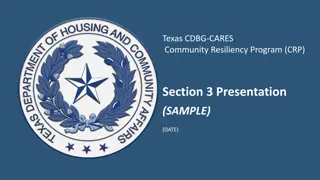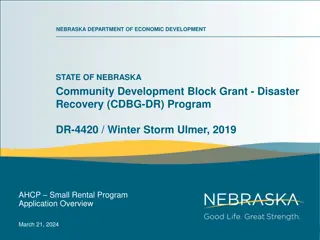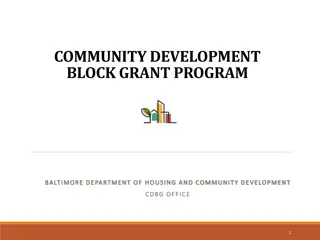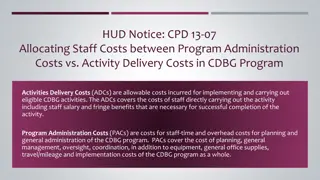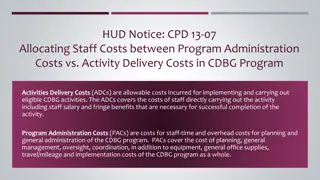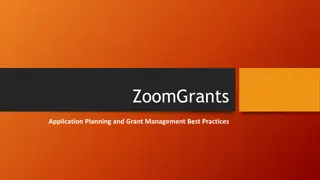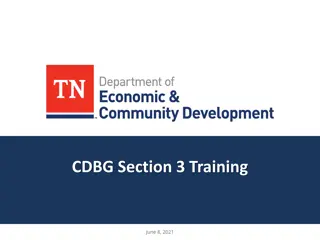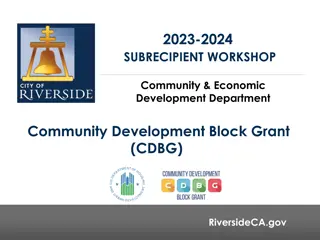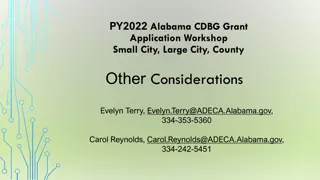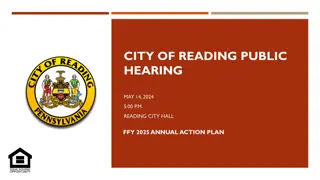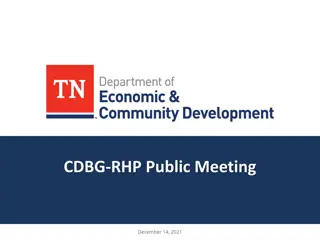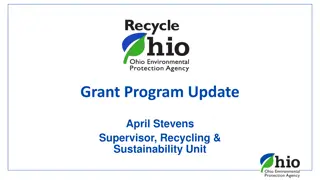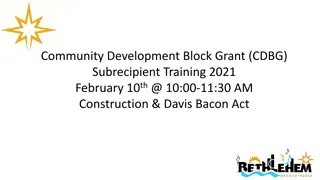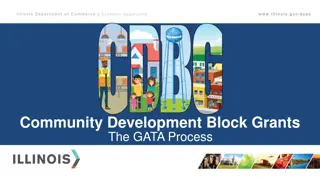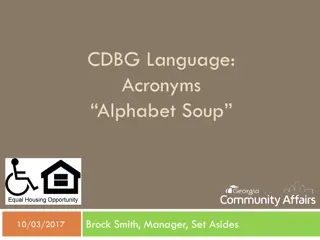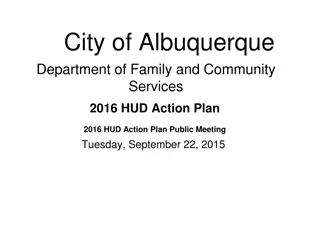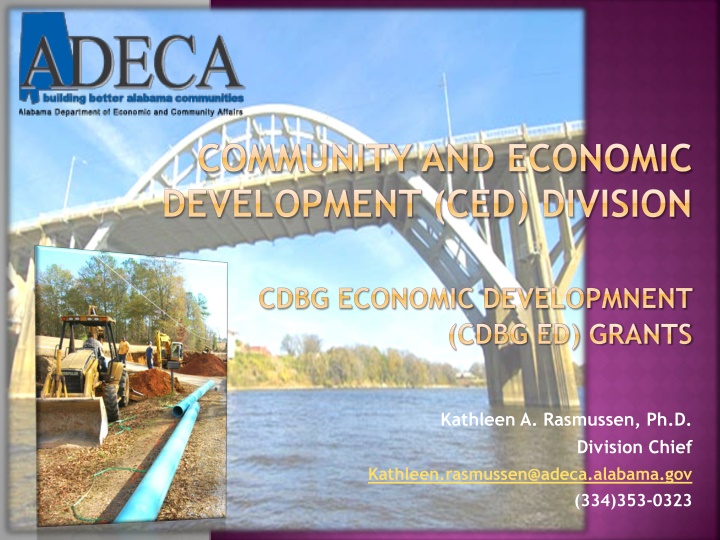
CDBG Economic Development Grants in Alabama - ADECA Overview
Learn about the CDBG Economic Development (CDBG.ED) Grants offered by Alabama's Department of Economic and Community Affairs (ADECA). These grants aim to support local governments in creating or retaining full-time equivalent jobs through infrastructure development and business expansion. Find out about eligibility, grant amounts, evaluation criteria, and more.
Download Presentation

Please find below an Image/Link to download the presentation.
The content on the website is provided AS IS for your information and personal use only. It may not be sold, licensed, or shared on other websites without obtaining consent from the author. If you encounter any issues during the download, it is possible that the publisher has removed the file from their server.
You are allowed to download the files provided on this website for personal or commercial use, subject to the condition that they are used lawfully. All files are the property of their respective owners.
The content on the website is provided AS IS for your information and personal use only. It may not be sold, licensed, or shared on other websites without obtaining consent from the author.
E N D
Presentation Transcript
Alabama Department of Economic and Community Affairs (ADECA) COMMUNITY AND ECONOMIC DEVELOPMENT (CED) DIVISION CDBG ECONOMIC DEVELOPMNENT (CDBG ED) GRANTS Kathleen A. Rasmussen, Ph.D. Division Chief Kathleen.rasmussen@adeca.alabama.gov (334)353-0323
CDBG Economic Development (CDBG ED) Grants The CDBG Economic Development Fund allows ADECA to fund activities that will bring economic development to local governments, resulting in the creation or retention of full-time equivalent (FTE) jobs. Eligible applicants for CDBG ED Grant funds include the non-entitlement local governments that meet the eligibility requirements listed under the CDBG ED Thresholds section in the 2023 CDBG Grant Application Manual.
CDBG Economic Development (CDBG ED) Grants Purpose: The purpose of CDBG ED Grants is to provide funds for infrastructure (such as water lines, sewer lines, rail spurs, docks, access roads, etc.), to facilitate the creation and/or retention of FTE jobs by a new or existing business. Maximum grant amount: $400,000 ceiling, although the ADECA Director may waive this grant ceiling amount. Cash match: 20% of the project cost is required, although the ADECA Director may waive this matching funds requirement.
CDBG Economic Development (CDBG ED) Grants Evaluation Considerations The CDBG Economic Development Fund grant awards will be evaluated based on the following 6 criteria: 1. The importance of the proposed activities (water, sewer, roads, lighting, site preparation, etc.) to the location for the start-up or expansion of a business 2. The number of full-time equivalent (FTE) jobs to be created by the business, and the number of those jobs that will be for low-income and moderate-income persons (LMI jobs) at least 51% 3. The proposed amount of local matching funds to be contributed by the local government
CDBG Economic Development (CDBG ED) Grants Evaluation Considerations (continued) 4. The scope of the new business or expanding business (the products it will manufacture, the markets for its products, its current or projected employment and payroll, the job skills/labor skills required for its employees to perform the jobs, etc.) 5. The urgency of the proposed activities (how quickly are the CDBG ED funds needed to be expended on the project s construction?) 6. The importance of the project to further HUD s welfare reform objectives (job creation for LMI persons to be lifted out of poverty in that geographic area)
CDBG Economic Development (CDBG ED) Grants The local government must have a written commitment from the business to create and/or retain the number of jobs as described in the application (may not count jobs created prior to the effective date of the ED Grant agreement, so only those jobs created after the effective date of the ED Grant agreement will be eligible to be counted in the job commitment) The project must not involve intrastate relocation of a business, except when such relocation is necessitated due to inadequacies associated with the existing location and a move to a new location will result in a greater number of jobs (see 24 CFR Part 570 for prohibition on the use of CDBG assistance for job-pirating activities / 26 or more jobs being relocated) CDBG ED grants will not be made where construction of the facility has started prior to the grant award date or the earliest possible date of ADECA s Release of Environmental Conditions. If such start is unavoidable, a waiver may be granted if a request is made to ADECA s Director prior to the start of any construction activity at the project site. ADECA may award CDBG ED grants any time of the year, even if the local government has a currently-open CDBG grant.
CDBG Economic Development (CDBG ED) Grants If your unit of local government is considering applying for a CDBG ED grant to assist a business, then please contact ADECA first for an in-person meeting with the ADECA Director to discuss the project: ADECA Director Kenneth W. Boswell Kenneth.boswell@adeca.alabama.gov (334) 242-5591 ADECA Deputy Director Elaine Fincannon Elaine.fincannon@adeca.alabama.gov (334) 353-5765 CED Division Chief Kathleen A. Rasmussen, Ph.D. Kathleen.rasmussen@adeca.alabama.gov (334) 353-0323
QUESTIONS? If you have any questions, then contact ADECA first!
CONTACT US ADECA Director Kenneth W. Boswell Kenneth.boswell@adeca.alabama.gov (334) 242-5591 CED Division Chief Kathleen A. Rasmussen, Ph.D. Kathleen.rasmussen@adeca.alabama.gov (334) 353-0323 ADECA Deputy Director Elaine Fincannon Elaine.fincannon@adeca.alabama.gov (334) 353-5765 CED Statewide Initiatives Unit Chief and CDBG Program Kathleen A. Rasmussen, Ph.D. Kathleen.rasmussen@adeca.alabama.gov (334) 353-0323 Antoinette Djonret, Assistant to CED Division Chief, Statewide Initiatives Unit, and CDBG Program Antoinette.djonret@adeca.alabama.gov (334)242-----


